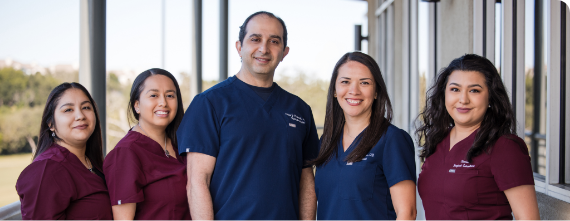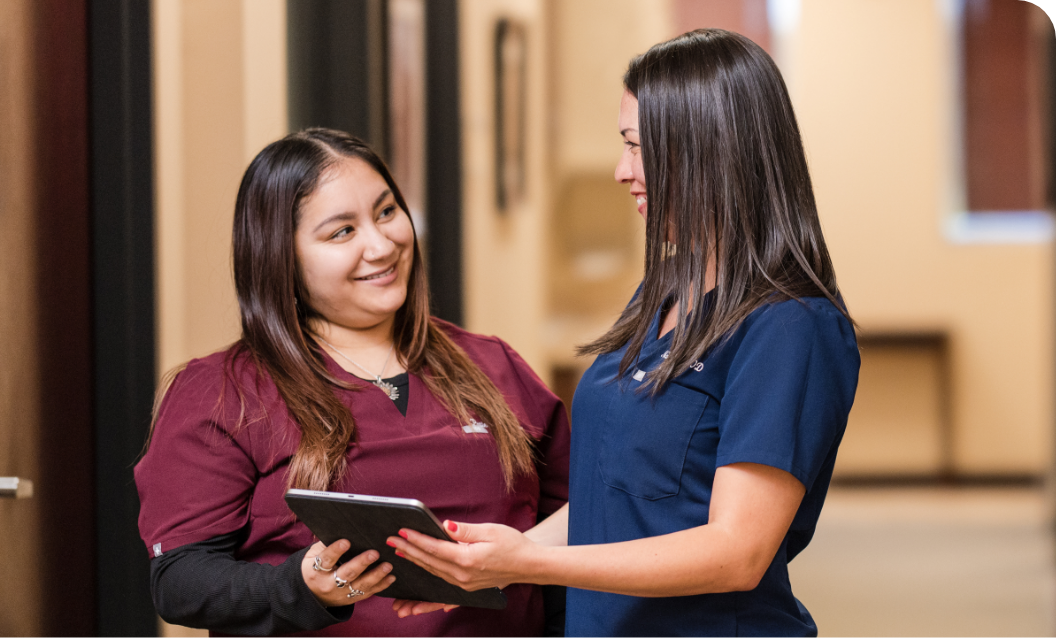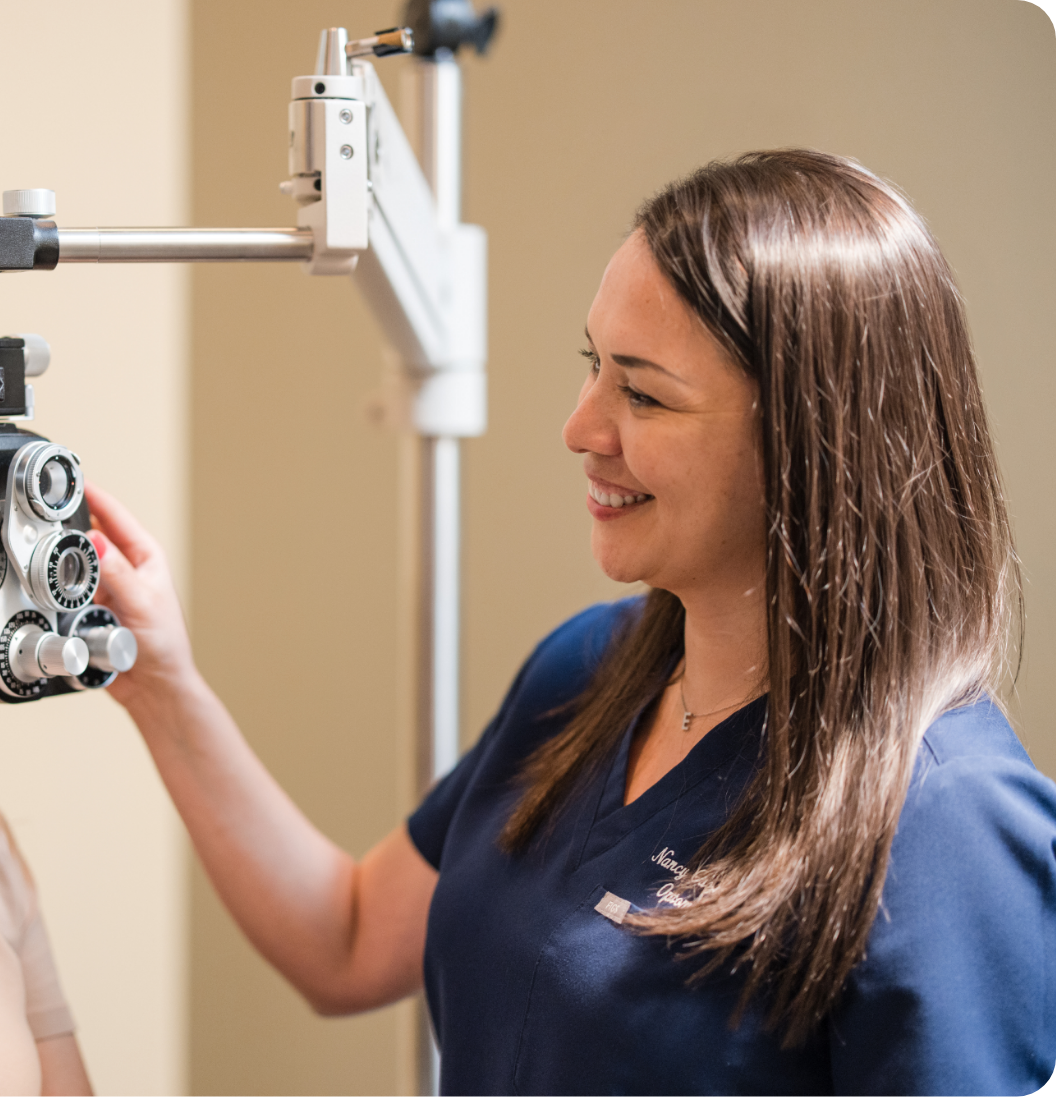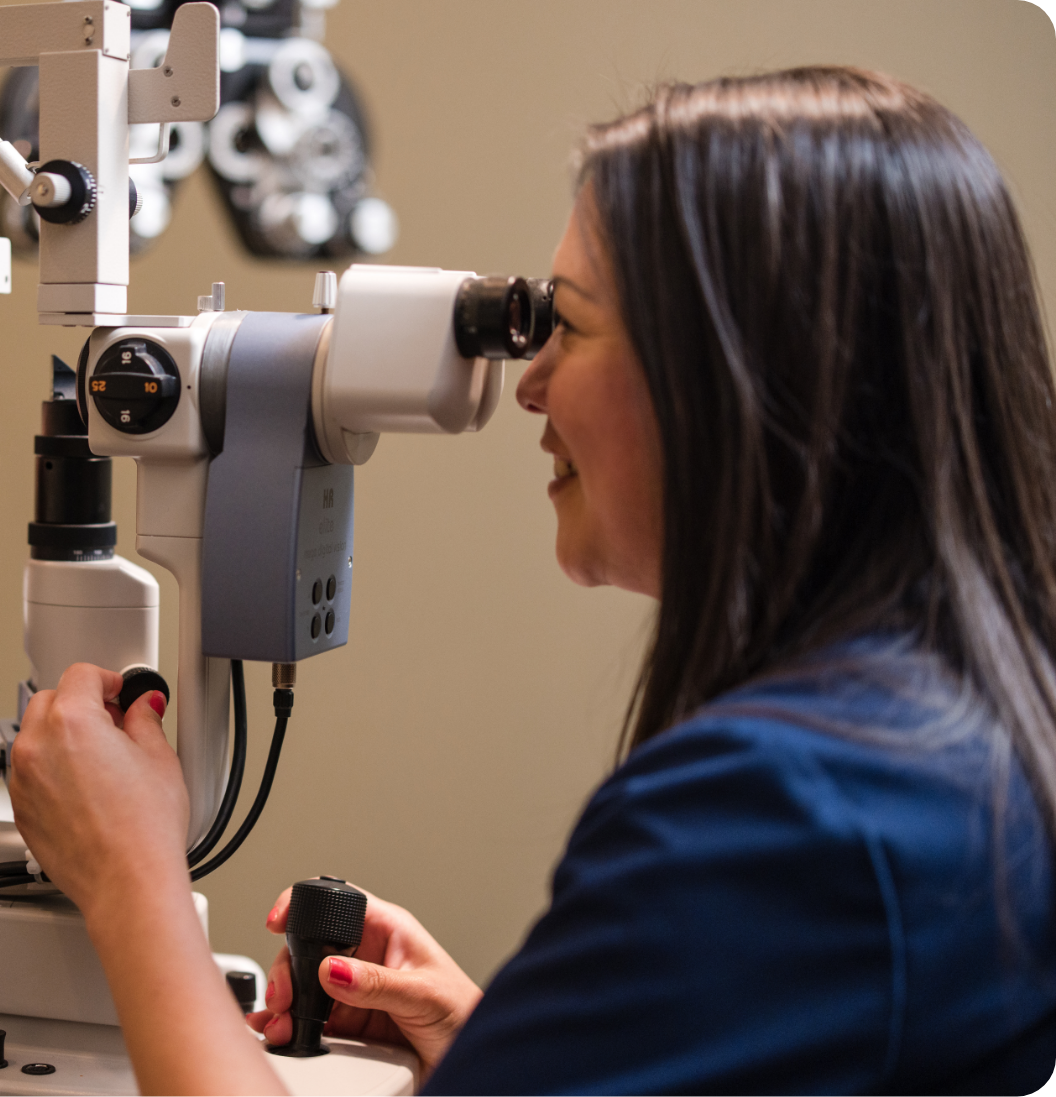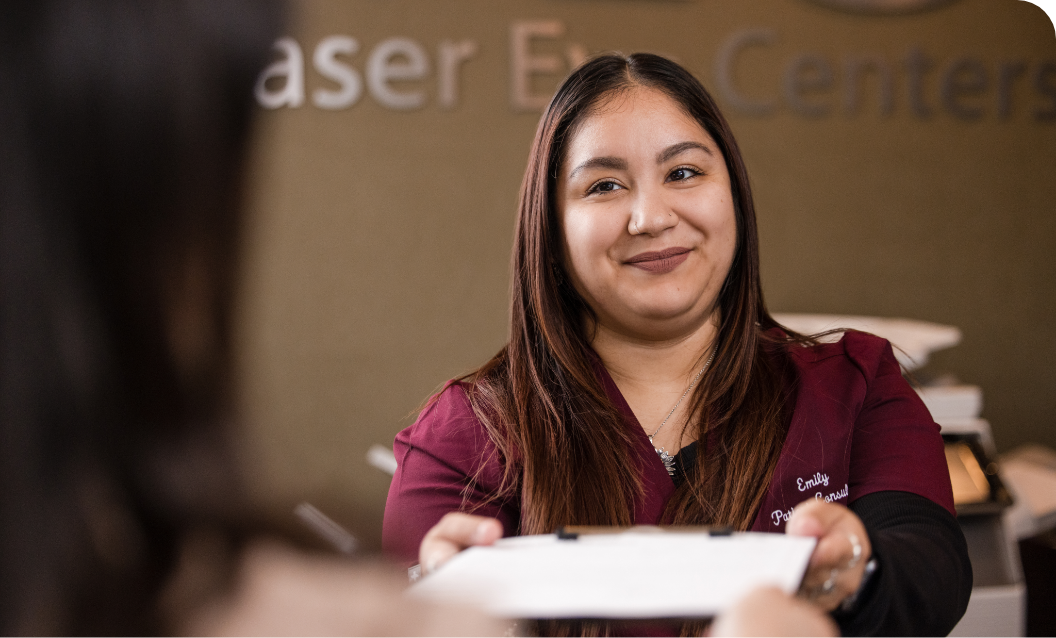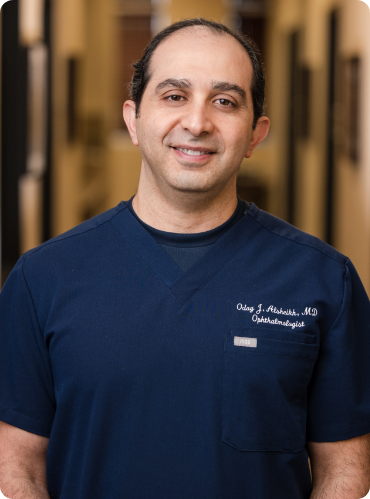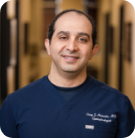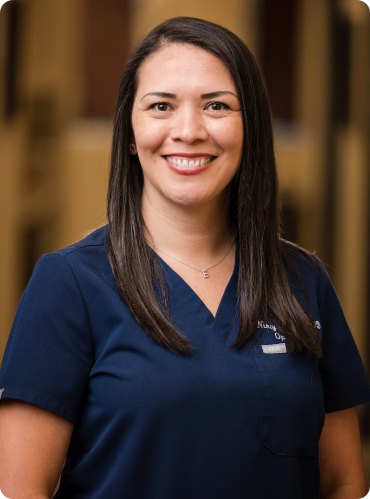Jump to Section:
What is LASIK?
Laser-Assisted-In-Situ Keratomileusis, better known as LASIK, is a type of eye surgery that uses lasers to reshape the front surface of your eye — the cornea — to permanently correct your vision and significantly reduce or eliminate your need to wear glasses or contact lenses. TLC San Antonio is one of the leading providers of LASIK surgery, thanks to the expertise of our experienced team led by LASIK expert Dr. Oday Alsheikh.
Eye Conditions Treated With LASIK Surgery
What is LASIK surgery used for? There are 3 main conditions that LASIK eye surgery can effectively treat:
Myopia: more commonly known as nearsightedness, where you can see objects that are nearer to you better than objects that are further away
Hyperopia: or farsightedness, where you can see objects that are further away from you better than objects that are nearer to you
Astigmatism: where objects appear distorted, fuzzy, or blurry at any distance
Meet Your Board Certified Eye Surgeons
How Does LASIK Surgery Work?
First, numbing eye drops will be applied to your eyes so you don’t feel any pain or discomfort, and you will be offered anti-anxiety medication. Next, your eye surgeon utilizes a laser to create a flap on your cornea and carefully lifts it to access the inner layers. Your vision will become momentarily blurry at this point. The next stage involves your eye surgeon carefully using invisible pulses of cool laser light, which are controlled by a computer, to reshape the inner layers of your cornea. The laser light is carefully targeted with the help of an eye-tracking device that ensures pinpoint precision.
Once your eye surgeon has finished reshaping your cornea, they will close the flap, making sure it lines up with its original position. An eye shield is then placed over your eye to protect it while it heals while also preventing you from rubbing it.
You may experience some discomfort immediately after your surgery; however, this usually only lasts for the first few hours after surgery and we recommend that you take a nap during this time to give your eyes a rest. Over the counter pain medications (ibuprofen or acetaminophen) will help to relieve irritation.
Types Of LASIK
There are 3 main types of LASIK:
Bladeless LASIK
also known as all-laser LASIK, which uses lasers to create the flap in your cornea instead of a specialized surgical blade called a microkeratome
Custom LASIK
which uses wavefront technology to provide your surgeon with additional information about the way light travels through your eyes — this results in more precise guidance on how your cornea should be reshaped to correct your vision
Topography-guided LASIK
which is the very latest innovation in LASIK and uses advanced technology to get more detailed information on the structure of your cornea, which helps your eye surgeon further customize your LASIK treatment.
At TLC San Antonio, our experienced eye doctors will talk you through each of these options so you can make the right choice for your vision.
TLC LASIK surgery – San Antonio, Tx
If you’re interested in LASIK surgery in San Antonio, TX, you’ll be in good hands when you come to TLC San Antonio. Our dedicated team of eye doctors and clinical staff are waiting to help you achieve the dream of clearer vision. Give us a call to start your vision transformation journey today.
Am I a Good Candidate for LASIK Eye Surgery?
One of the most common questions we get asked when people first contact us is “do I qualify for LASIK?”
The first step we take is to invite patients to visit us for a free LASIK consultation, so our expert eye surgeons can perform extensive pre-operative testing, scans, and measurements of your eyes to ensure you are a good candidate for LASIK. These include a comprehensive eye exam to measure your prescription, a thorough check of your eye health, as well as discussing your lifestyle and expectations with LASIK surgery.
During this consultation, our eye surgeon will also be able to determine if you are a candidate for laser eye surgery, and if so, which procedure is most appropriate for you. You can learn more about this here.
Other factors your LASIK eye surgeon will take into consideration during your consultation include:
Your Age
Your eyes are still changing shape as you age, so it’s important that your vision has stabilized before having corrective eye surgery to ensure the best possible vision throughout your life. LASIK is recommended for people who are at least 18 years old and who have had a stable prescription for a minimum of 2 years.
Your Health
LASIK is not recommended for those with certain health issues or eye diseases, such as uncontrolled diabetes or keratoconus, and it is also not recommended for those with certain retinal and optic nerve diseases.
Patients should notify their eye doctors of any medication or other condition that compromises the immune system. In addition, be sure to tell your eye doctors about all medications you are taking.
Lasik candidates should not be pregnant or nursing when undergoing the LASIK procedure. Hormones may affect the stability of your prescription, so pregnant women should wait until after their pregnancy to pursue LASIK surgery.
Corneal thickness also plays an important role in determining candidacy for LASIK. Your LASIK surgeon will carefully analyze your corneal thickness prior to your LASIK procedure to make sure it is safe for you to have the procedure.
Your LASIK surgeon and eye doctor will always work together to identify, control, monitor and in some cases treat specific pre-existing conditions that may enable you to qualify for LASIK.
Your Prescription
LASIK eye surgery works best for people who have a stable prescription that hasn’t changed for at least one year.
We know every patient has a unique prescription, and some will fall outside the limits of LASIK surgery, which means you may not qualify for it. If you do not qualify for LASIK surgery, we may be able to offer alternative vision correction surgeries including ICL, PRK and RLE.

Post LASIK Care
Many patients feel comfortable after a short nap following their procedure. For the first week after LASIK, it is required that patients wear plastic eye shields while sleeping to prevent any unconscious eye-rubbing. It is important not to rub your eyes during the early healing stage.
After the LASIK procedure, many patients are surprised at how quickly their eyesight returns. Recovery tends to be fast, with most patients returning to their regular daily routine within a week of surgery.
However, follow-up care is as important as the procedure itself. Post-LASIK care ensures proper healing and comfort. Use the tips below to stay on track and receive the most out of your LASIK surgery experience.
- Schedule Follow-Up Appointments: Be sure to schedule all follow-up appointments with your eye doctor for the first three months after your LASIK procedure. Annual eye exams will still be necessary following laser vision correction to ensure the continued health of your eyes.
- Follow Your Doctor’s Directions: Follow-up visits with your primary eye doctor are critical and allow for individualized changes according to your healing response.
After LASIK Follow-Up Care Timeline:
- The first week: Your doctor will prescribe eye drops to reduce the risk of infection, inflammation, and to prevent dryness.
- The first few months: Your doctor will monitor the healing process and make sure that your eyes are comfortable and seeing well.
Returning to Normal Activities After LASIK
Many patients return to work within a day or two after their LASIK procedure. Be sure to follow the restrictions below. Otherwise, as long as you follow your doctor’s instructions, you should be free to resume all of your normal activities.
- Your doctor will tell you when it is safe for you to drive following surgery, typically after one day.
- Wear sunglasses to protect your eyes for at least the first week after LASIK surgery.
- Read in moderation for the first few days after your LASIK procedure.
- Do not wear eye makeup for one week.
- Do not rub your eyes for at least 1-2 weeks after you have LASIK
- Do not rub your eyes for at least 1-2 weeks after you have LASIK. After that, gentle rubbing is allowed. As always, vigorous rubbing can be harmful.
- Do not exercise for one week.
- Avoid swimming and hot tubs for one week after your procedure.
- Avoid gardening and dusty environments for one week.
- Avoid contact sports that could result in an eye injury for one month.
- Smoking is allowed, but the smoke may irritate your eyes.
PRK Recovery
Like LASIK, PRK eye surgery corrects nearsightedness, farsightedness and astigmatism. The time it takes to perform the surgery is the same as LASIK, but as because the PRK procedure is performed differently, the recovery time can take slightly longer. Individual healing times vary for each person, so be sure to discuss this with your surgeon.
Financing
At TLC San Antonio, we aim to combine exceptional clinical standards with competitive pricing, giving you the best value for LASIK surgery in the country.
Free Consultation
We offer a FREE initial LASIK consultation to help you get started with thinking about your vision correction treatment options. The initial consultation also helps patients to decide on a LASIK provider.
LASIK Eye Surgery Cost – More than just the price.
LASIK eye surgery cost is about much more than monetary value. When considering LASIK surgery prices, you might be tempted to choose the cheapest provider, but doing so could risk your chances of a successful outcome. Cheap surgery often means a less experienced surgeon, older equipment, and therefore, less advanced technology – all of which may increase the risk of an undesirable outcome
The Price of Excellence
By coming to TLC San Antonio, you can trust our highly skilled surgeons and our surgical team to provide excellent care before and after surgery. You’ll also be able to benefit from the latest surgical technology and diagnostic testing in a safe and comfortable environment. This inevitably comes at a price; however, we strongly believe that it’s always worth investing in your vision.
Finance Options
We understand that not everyone can pay for LASIK surgery up front, so we offer a variety of ways to make it more affordable for you. You can find out more details on our LASIK financing and insurance page.
LASIK Surgery Price Breakdown
There are several things that should be considered when looking at the cost of LASIK treatment. Along with the procedure itself, additional factors that contribute towards the final cost include:
- the type of LASIK surgery you are undergoing
- all post-operative care
- LASIK touch-ups
- the surgeon who is performing your surgery
With all of this in mind, our quality providers will provide a more personal approach, leading to less chance of complications and a faster recovery time for you.
With TLC San Antonio’s bundled pricing you can rest assured there won’t be any surprises along the way.
LASIK Savings Calculator
Frequently Asked Questions
Excellence in LASIK Eye Surgery in San Antonio
We are dedicated to giving all of our patients the best experience possible. We’re here to put your mind at ease; with our experienced ophthalmologists and state-of-the-art technology, we can guarantee you’ll receive the most professional, reliable, and personalized treatments in San Antonio.



